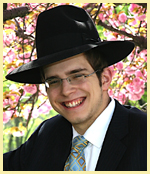Taking Personal Blame
[Editor’s note: As a memory of my beloved brother Shaya, I would like to continue sending out his pearls of wisdom that he has shared with all of you in the past. For some of you this may ring a bell and for others it may appear to be totally new. May the learning of Shaya’s Divrei Torah inspire us to change our ways and thereby give an Aliya to the neshama of our dear beloved Shaya whom we miss so much. A special thank you to Aaron Friedman for always looking over the divrei torah.]
The Gemara in Brachos says about one who designates a place for his davening, that ‘The G-d of Avraham will help him, and when he dies, people will say about him ‘woe to us that we lost such a humble person…’ What does having a designated place for davening have to do with humility?
My Rebbi, Rav Kalman Weinreb, explained in the name of Rav Bergman shlita, as follows: Why would a person move around and switch seats? A person can think to himself, ‘I couldn’t have concentration in that seat because the guy next to me was davening too loud. I couldn’t have concentration in that seat because the heat or air conditioner was blowing right on me…’ He will keep hopping around from place to place, blaming the surroundings for the lack of his concentration. However, a Yid who designates a specific place for davening is saying ‘if I didn’t have kavana [or wasn’t successful in what I was davening for], it wasn’t Yankel’s fault, it wasn’t the heat’s fault, it was my own fault. I will try again from that very same place.’
That was exactly what Avraham Avinu did. Avraham davened that the people of Sedom should be spared destruction but was unsuccessful in saving them. Immediately after relating that Sedom was destroyed, the Torah tells us that Avraham went back to the same spot where he had davened for the people of Sedom to pray for something else.
Taking personal responsibility is the definition of humility, and shirking that responsibility is conceit.
The Mishna in Avos tells us that one of the three attributes that differentiate a student of Avraham from a student of Bilam is that the student of Avraham has a HUMBLE spirit [as we have shown,] and the student of Bilam has an ARROGANT spirit.
Where does Bilam display arrogance?
In this week’s Parsha, with exactly the same scenario! Bilam tries to curse Klal Yisroel, and is unsuccessful. Balak then takes Bilam to another place, and then another place to try to curse Klal Yisroel. A humble person, as we said, would say ‘no, I’m not going to move or switch. I am going to go to the same place and try again.’ But Bilam, being a haughty person, listens to Balak, and continues in going to other places, blaming the former place for his inability to curse!
The Mishna in Avos concludes, ‘we will enjoy the fruit of our good deeds in this world and inherit the world to come.’ Some people think that if you live an immoral life and do what you want to do without rules and boundaries, although you will lose out in the world to come, you will at least enjoy this world. The truth is that such a person will not enjoy this world either. Not only will he live a meaningless life, but he will also fall prey to his bad midos. His jealousy, lusts, and ego will overtake him and never allow him to be satisfied with what he has. However, a person who has good midos and strives to do the will of Hashem will enjoy even this world much more than the person with bad midos. Hence, the Mishna says that someone with good midos enjoys both worlds, whereas someone with bad midos has nothing in either world.
May we all follow in the footsteps of our forefather Avraham by emulating his midos to the best of our ability.
{Editor’s note: This Shabbos, we will begin the three weeks, ending with Tisha B’av, the day we mourn the destruction of our Beis Hamikdash. The Gemara says that if a person lives in a generation that the Beis Hamikdash has not been rebuilt, he must consider as if his generation destroyed the Beis Hamikdash.
Rabbi Aharon Feldman pointed out that the Gemarah is teaching us that we have to look at the destruction of our holy temple as if each and every one of us destroyed the Beis Hamikdash. The only person to blame is ourselves. Rabbi Feldman pointed out that if we would examine ourselves carefully, we would see that we exert so much effort in our daily and personal life to shift the blame from ourselves on to other people. “I was late to work because of this reason,” or, “I couldn’t finish the project because of this…” that is the beginning of our personal destruction. When we wipe away all of the excuses and “step-up to the plate,” we will be transformed into stronger and better people who can take to the plate and face any of the pitches that Hashem throws our way. Instead of bunting to first base, we can hit a home run right out of the park.
May we all take this lesson to heart as we enter into the three weeks; that it is our own faults and shortcomings that cause us to be the way we are and once we come to that realization, we will be able to work on ourselves and rebuild our own Beis Hamidash and ultimately bring Moshiach with the Beis Hamikdash in our days.}
To be added to the weekly Dvar Torah list please email zichronshaya@gmail.com



